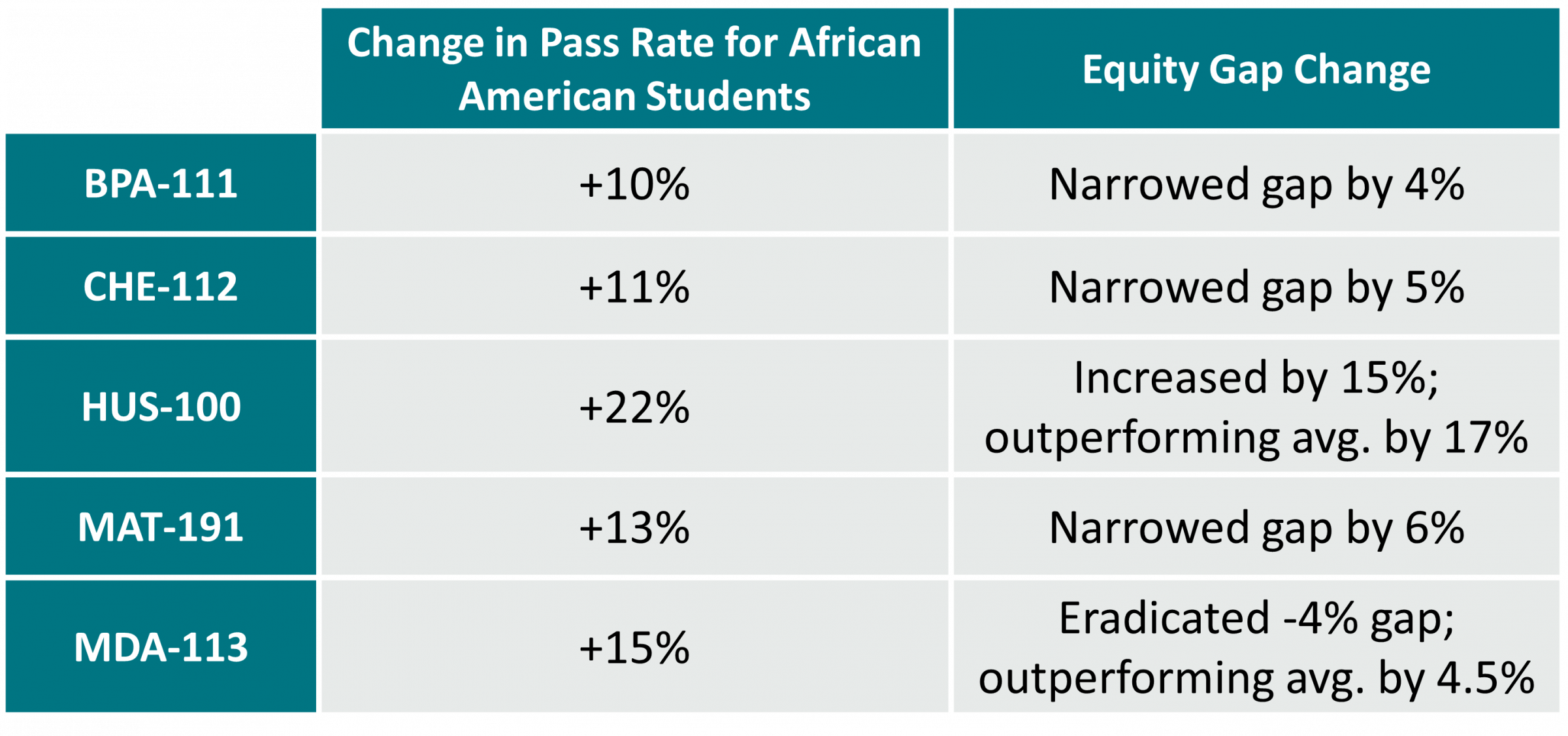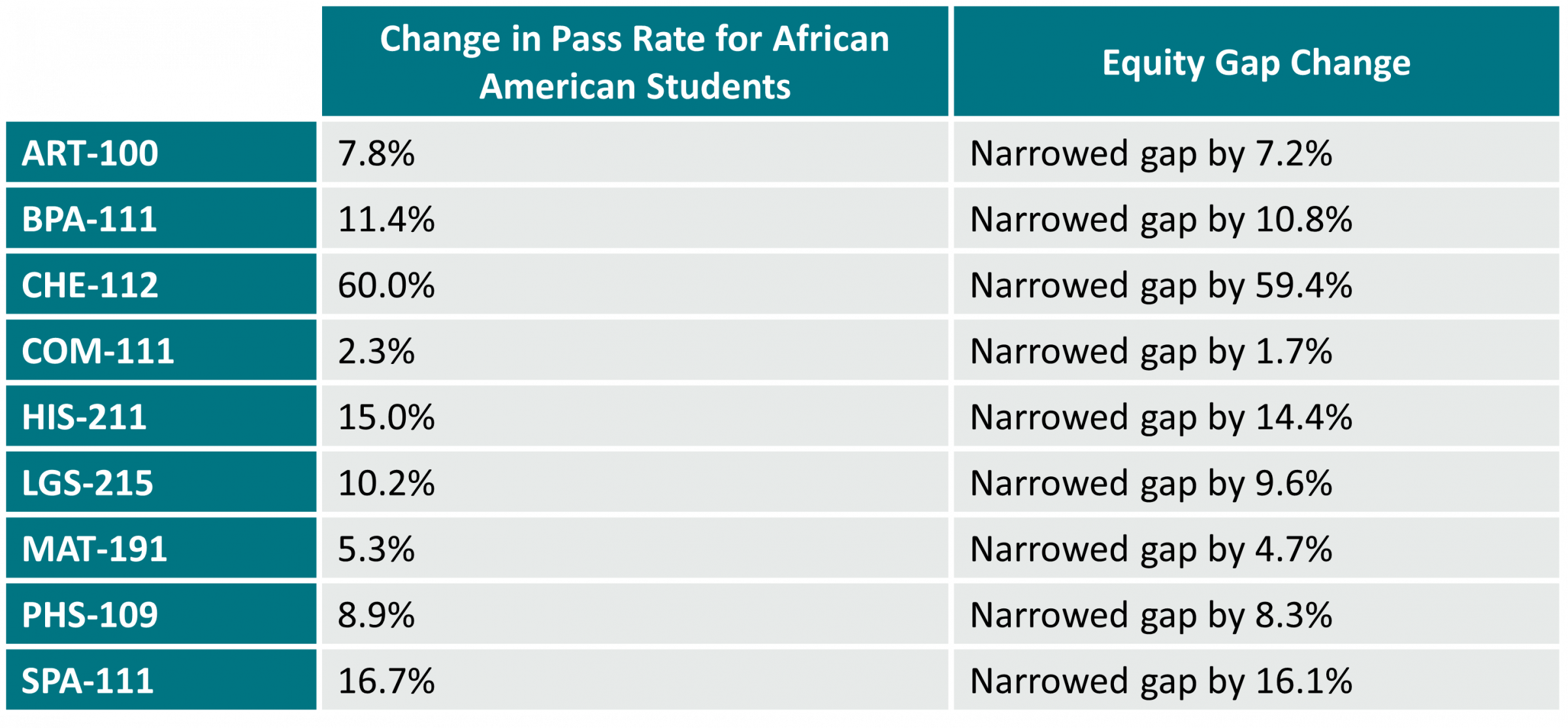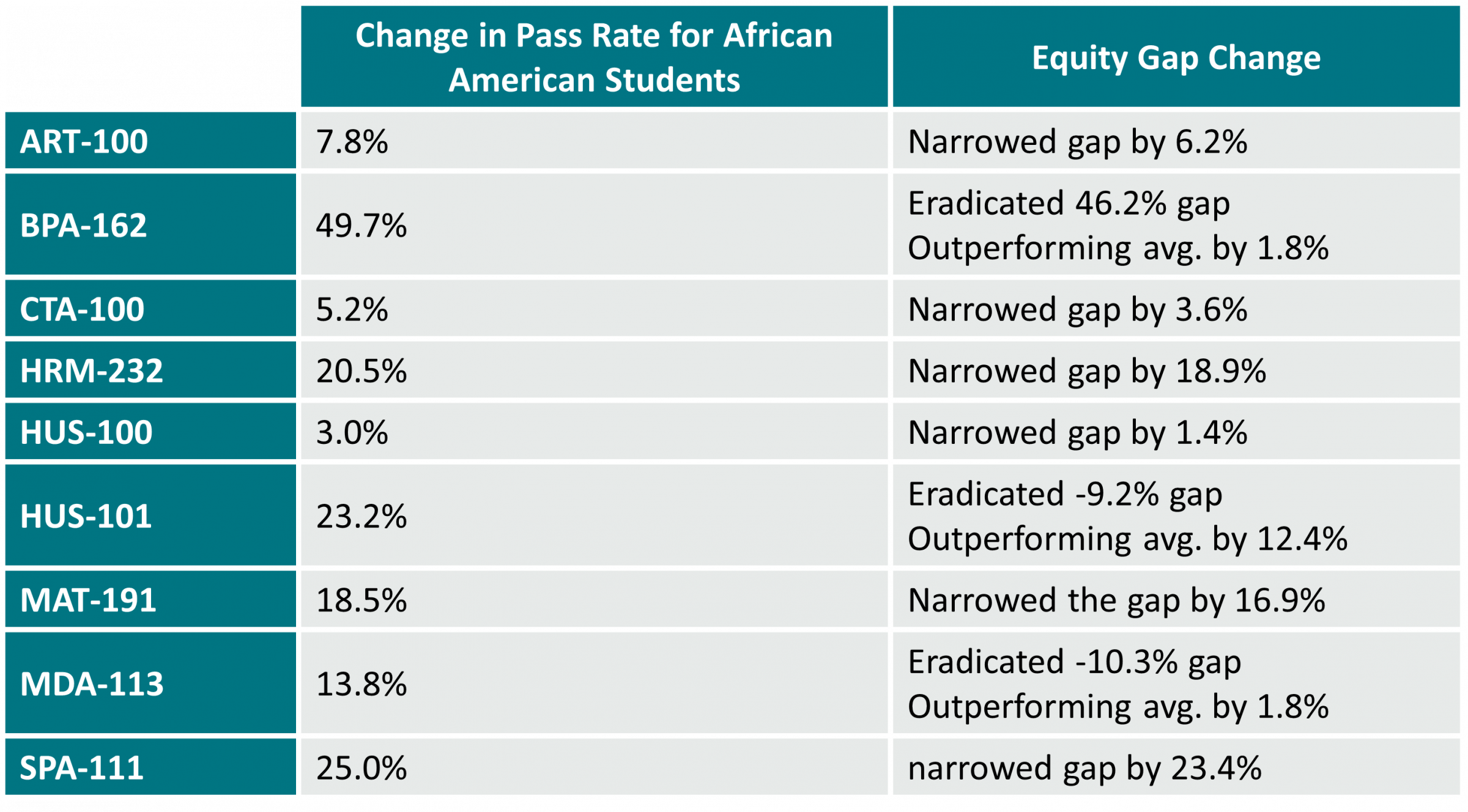Anne Arundel Community College: Model Course Program

Since its inception, Anne Arundel Community College’s (AACC) Model Course Program has provided over 100 faculty members with the opportunity to deepen their understanding of social hierarchy, structural inequalities, and individual-level biases and to apply diversity, equity, inclusion, antiracism, and accessibility (DEIAA) theory and praxis to their curriculum and pedagogy. The program began with a focus on highly enrolled classes, with the goal of eradicating race/ethnicity-based equity gaps in student outcomes. Each year, the program has evolved, expanded, and continuously improved based on feedback from mentors and faculty participants.
The Model Course Program, initially called Equity Response Teams, began in 2016 under the leadership of the Vice President of Learning and inaugural Chief Diversity Officer. Equity Response Teams were created to be a one-year solution to address equity gaps in high enrolling, low performing classes; however, the work ended up spanning three years. In 2019, Equity Response Teams were transformed into the three-phased Model Course Program, which was organized, designed, and facilitated by faculty members and other experts across the campus. Participants from different disciplines committed to work in teams to organize, plan, execute, and evaluate practices that reflect teaching excellence.
After receiving input from faculty and staff participants and academic leadership, the Model Course Program was pared down in 2021 to focus on:
- Incorporating and assessing DEIAA practices for a particular course;
- Collaborating with faculty and staff from across the college;
- Producing resources and toolkits for other instructors who may teach a course;
- Incorporating and assessing DEIAA practices for each participant’s department or program; and
- Developing and implementing institutional professional development for each participant’s department or program.
Model Course Goals and Outcomes
Model Course Program goals are curriculum alignment and teaching excellence. Culturally responsive teaching; learner-focused curricula; and antiracism, diversity, equity, and inclusion efforts are top priorities. Learning outcomes for faculty participating in the Model Course Program over the course of an academic year include, but are not limited to:
- Understanding of pedagogy, practices, and climate that help sustain an inclusive learning and working environment.
- Self-awareness to identify and challenge implicit biases and inherited assumptions.
- Leadership in developing public pedagogy.
- Ability to identify and address structural and/or institutional inequalities.
- Continuous improvement with a plan for assessment and analysis within a goal-based and data-driven culture of responsibility.
Model Course Program training includes topics such as critically responsive pedagogy; syllabus reform; equity-focused student support services; embedded resources, such as the Student Achievement and Success Program; social capital, stereotype threat, and White fragility; cultivating a culture of accountability; social identity; power, privilege, and inequity; and conversations to foster DEIAA. In model courses, (a) instruction aligns with course outcomes and contributes to Model Course Program outcomes (i.e., tightens the curriculum); (b) instruction is culturally responsive and student focused and addresses diversity, equity, and inclusion; and (c) assessment is utilized to inform future decisions for course delivery and continuous improvement.
About the Model Course Program
The Model Course Program allows faculty time and space to discuss learning and critical pedagogy. With its focus on teaching, learning, equity-mindedness, and community-building, the program has received rave reviews over the years.
What Faculty Say
“I have loved Model Course because it gives me the opportunity and time to collaborate with my colleagues. This is not something we did before as far as curriculum is concerned (or not this in-depth). We were mostly in our own silos. Model Course has pushed us to purposefully consider what and how we are teaching. It has been ‘life changing’ on an academic level.”
“Model Course has helped us become better, more reflective instructors. What has been impactful for me is the connection between DEIAA work and student success and the recognition of things that might seem ‘neutral’ but are instead sending messages of encouragement and inclusion, or apathy and exclusion.”
“Model Course Program has helped me to shift to focus on data-driven results when incorporating DEIAA and creating a community among faculty. We are tasked to build a community in our courses, so our students feel supported. Model Course is one place where we as faculty can get that support and build our own community.”
What Students Say
In survey responses ascertained at the end of each academic year, the vast majority of AACC’s model course completer students indicated that they were impressed by the welcoming atmosphere and sense of community. One student said, “What I liked best about the course was how included I felt.” Several sensed that the faculty and staff supported and cared about them. One asserted that, “Faculty and staff were always there to support the students in whatever they needed.” Another noted that they felt part of a community, even though the course was taught via Zoom.
Model Course Program Data
Courses taught by faculty who have completed the Model Course Program have shown significant narrowing in equity gaps across disciplines over the years. The graphics below highlight recent successful outcomes for African American students completing courses taught or developed by faculty who participated in the Model Course Program. Success rate improvements range from 2.3 to 60 percent, and equity gaps between African American and overall pass rates were narrowed and, in some cases, eradicated. There were also courses in which African American students outperformed other students.
Course Equity Gaps: Fall 2019 - Fall 2020
Course Equity Gaps: Fall 2021 - Fall 2022
Course Equity Gaps: Fall 2022 - Spring 2023
Final Thoughts
As the signature DEIAA initiative at AACC, the Model Course Program shows no signs of slowing down. In addition to improving courses throughout the college, the program has resulted in a significant increase in the level of DEIAA-related expertise among our colleagues. Through their work engaging with the curriculum as well as their own independent efforts to apply this curriculum to their individual disciplines, participants in the Model Course Program have developed skills and knowledge that can be shared within our institution and throughout the higher education community. The success of the Model Course Program has helped position AACC as a leader in DEIAA work with the narrowing or eradication of equity gaps in dozens of courses that impact thousands of students each semester.
Drs. Julie Grignon, Johnny Lew, Kellie McCants-Price, Lori Perez, Heather Rellihan, and Tina Smith are faculty at Anne Arundel Community College in Arnold, Maryland.
Opinions expressed in Member Spotlight are those of the author(s) and do not necessarily reflect those of the League for Innovation in the Community College.













